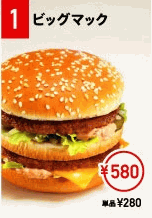The Big Mac index
By Murray Bourne, 03 Jun 2007

A BIg Mac in Japan costs
280 yen, or US$2.31.
My sister-in-law is on her way to the UK. She asked a good question: "How much does one British Pound buy, anyway? How does it compare with the Australian dollar (currently worth about 41p, or 0.41 pounds)?"
I told her about the Big Mac index, which The Economist magazine suggests is a way to compare the actual value of currencies.
The Economist.com says in The Big Mac Index article:
The Economist’s Big Mac index is based on the theory of purchasing-power parity (PPP), according to which exchange rates should adjust to equalise the price of a basket of goods and services around the world. Our basket is a burger: a McDonald’s Big Mac.
The rates as per Feb 2007 indicate that a Big Mac in Australia costs US$2.67. In Britain, a Big Mac costs US$3.90. So it means my sister-in-law will be forking out around 50% more of her Australian dollars than she would for similar items in Australia.
The article has the following disclaimer:
[The Big Mac index] is only a rough guide, because its price reflects non-tradable elements such as rent and labour.
Rough it may be, but it is valuable in determining the relative value of currencies.
See the 4 Comments below.
30 Aug 2008 at 10:01 am [Comment permalink]
A Big Mac in Japan now costs just 200yen.
So the UK Big Mac is more than twice the price (rough equivalent of 420 yen) for exactly the same thing.
Sean.
30 Aug 2008 at 10:18 am [Comment permalink]
Thanks for your input, Sean.
Currencies are very unstable across the world currently (since late 2007). One thing I notice is that when currencies move in one direction, retailers put up their prices quickly, but when currencies move the other way, prices are remarkably slow to go down.
Anybody else got some local Big Mac price knowledge to share?
2 Jul 2011 at 4:36 am [Comment permalink]
how much is big mac in israel in us dollars
2 Jul 2011 at 5:37 am [Comment permalink]
@yoel: This search will tell you!
https://www.google.com.sg/search?q=how+much+is+big+mac+in+israel